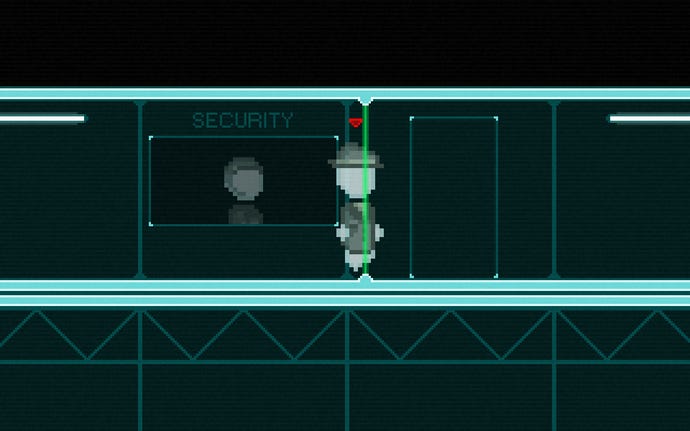A Chat with Location Services' Owl Cave Games
Richard & Alice developer Owl Cave has a new adventure coming soon, so what better time to sit down for a chat?
This article first appeared on USgamer, a partner publication of VG247. Some content, such as this article, has been migrated to VG247 for posterity after USgamer's closure - but it has not been edited or further vetted by the VG247 team.
Owl Cave (formerly Denby/Raze) is a small independent British developer founded by game journalists Ashton Raze and Lewis Denby. Following up on the critical success of Denby and Raze's first title, the bleak, mature adventure Richard & Alice, they teamed up with community manager and artist Molly Carroll to start work on a new game: Location Services. I sat down for a chat with Raze and Carroll to find out what it's all about -- and where their company's distinctive name came from.
"You'd be surprised just how difficult it is to find a decent company name that hasn't already been used," jokes Raze, in reference to the studio's original, rather literal moniker. "Molly had done a little bit of work on [Richard & Alice] -- she'd written the journal you find in the third flashback and done some beta testing -- but we'd been working on other things together, like our Twine game, Never Have I Ever, so I suggested to Lewis we hire her for a bit of other work too. He came back with 'let's make her a partner!' and thus Owl Cave was born."
"And I was all like, 'awww yeah!'" interjects Carroll. "Suddenly Denby/Raze wasn't a terribly accurate name, and Denby/Raze/Carroll sounds like we're trying to go all Mad Men with it or something. Owl Cave was a location in the show Twin Peaks -- a mysterious cave full of Native American pictoglyphs, one of which unlocked a sort of puzzle mechanism. I thought it was a pretty appropriate reference, given the sort of games we make. Also, it just sounds cool."
True enough. And bonus points for a Twin Peaks reference.
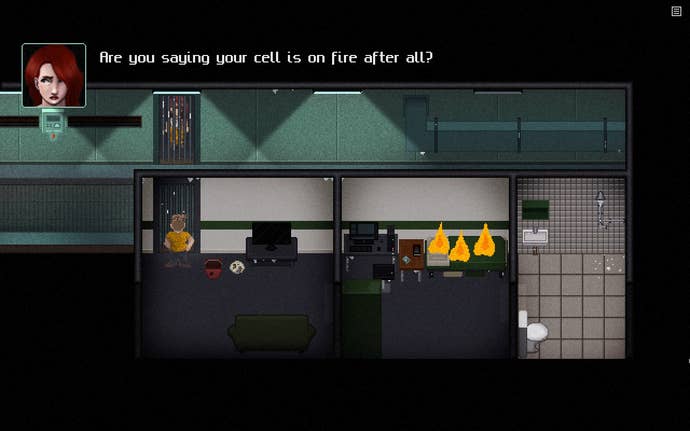
Prior to working on Richard & Alice, all three members of the team had dipped their collective toes into the murky waters of game development and the surrounding industry: Raze had made a not altogether serious game called Super Tower Defence -- which he was delighted to have branded "draconian" by Alec Meer of PC-centric gaming site Rock, Paper, Shotgun -- and had also helped beta test a couple of games made by Denby, one of which is available via Owl Cave's site. Carroll, meanwhile, still works with Chucklefish, the studio behind upcoming space exploration sim Starbound, when she's not working on art and design for Owl Cave.
"For a narrative-driven game, it's very hard to convey that much when you're not actually playing or talking about the finished game."
Richard & Alice finally launched to the public in February 2013, and was widely praised for its mature narrative. To the team's great pleasure, feedback wasn't confined to the community, either; mainstream gaming sites like Rock, Paper, Shotgun, Destructoid, Joystiq and Edge all picked up on the game and had very positive things to say, particularly with regard to the game's story.
"I was very pleased with it, yeah!" says Raze, proudly. "Especially since we had such a limited budget to start off with and had to make a few compromises when it came to art and that. When we first put it up on Greenlight before launch, the response wasn't too great, but for a narrative-driven game I think it's very hard to convey that much when you're not actually playing or talking about the finished game."
This is something of a problem with services like Greenlight, and with previewing narrative-centric games in general -- it's difficult to get across what's so great about the game without spoiling it, since stories and the feelings they evoke in an individual are not something that can be easily represented visually -- not to mention the fact that everyone has the capacity to respond to emotional stimuli differently. In the meantime, too, you constantly run the risk of the more... impulsive members of the community ignoring the old adage that you shouldn't judge a book by its cover.
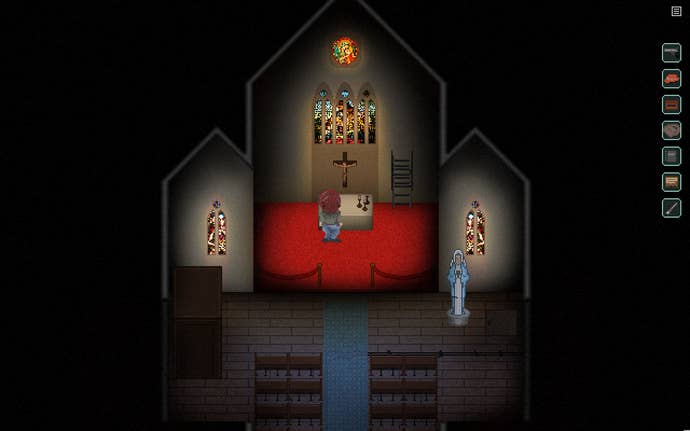
Richard & Alice's dated-looking 2D visuals certainly aren't out of place in the indie games community, where retro aesthetics (and, sometimes, game mechanics) are often deliberately adopted to invoke feelings of nostalgia in the player. Raze admits that they didn't have much choice but to go with the art they had for Richard & Alice, but was pleased to hear people discuss the game in such a manner that looked past the graphics and saw what the team's real intentions were.
"It was described as 'adult, mature' and so on, which is fantastic, because in my opinion it was (hopefully) an adult, mature story," he explains. "But because the game's pretty damn depressing and bleak too, I feel like post-Richard & Alice, I want to make a point that I believe stories can be adult and mature, and tackle serious issues, without being depressing also. Also the obvious thing that 'mature' doesn't have to equal 'violent' or 'sexual.'"
I'm pleased to hear Raze say this, as it's something I very much agree with, as you'll know if you read my discussion on this very issue recently. But where does Location Services, Owl Cave's new game, fit into this worldview?
"With Location Services, I've tried to show a different way in which I'd like to approach serious issues, by writing a story that is actually pretty uplifting and light-hearted," Raze explains. "I've taken the things people seemed to love about Richard & Alice, and tried to subvert them somewhat while retaining the part they liked in the first place, and I hope that's paid off."
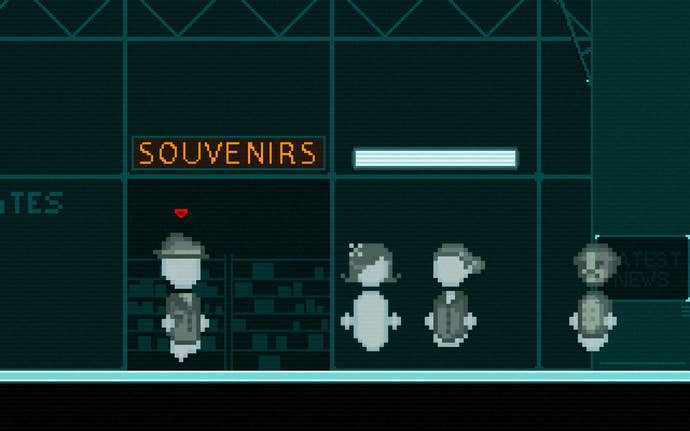
Bold words indeed. But you're probably wondering at this point exactly what on earth Location Services actually is. I ask Raze what his "elevator pitch" for the game would be if he was trying to sell it to someone who had never come across it before -- like, say, a new USgamer reader.
"It's a game about privacy, identity, digital ownership and society in general," he says. "It's also a game about anagrams, grid puzzles and mechs. It's a side-scrolling adventure game in which you play a guy called Anthony Lira, whose job it is to locate people for money. He lives in a world called The Server, and the Server's inhabitants are aware they live in a digital world, but don't fully know why, or what else there might be."
"It's a game about privacy, identity, digital ownership and society in general."
Location Service's subject matter is particularly relevant given recent discussions on the nature of ownership in the digital age -- and, of course, Microsoft's flip-flopping on whether or not it wants to enforce its much-derided restrictions on game ownership with Xbox One. Was this deliberate?
"There's a few specific messages I've tried to get across with the story, although I think to talk about them would be to give too much away," Raze tells me. "Identity is a big one, though. I wanted to play around with the concept of identity, and being able to identify as who you want to identify as, unrestricted by biology or, to an extent, society."
This is a subject that is particularly pertinent in 2013, as many people are becoming increasingly socially-aware with regard to issues such as gender identity, sexuality and how you choose to represent yourself to the world -- and, at the same time, these same groups encounter significant resistance on a daily basis. The digital realm has always been a means through which individuals who find themselves oppressed in the real world can express themselves freely; online communities such as freeform MMO Second Life continue to thrive thanks to their myriad niche subcultures who have carved out a place for themselves online.
So who is Location Services for? Is it particularly targeted at people who are interested in the concept of online and/or digital identity? Or is it aimed at a broader audience?
"I think, or hope at least, that Location Services will appeal to the same audience as Richard & Alice -- fans of adventure games, old-school style," explains Carroll. "But it's also kind of different to the usual adventure game: it's not a point-and-click, and its puzzle structure is somewhat different. Hopefully it'll appeal to, well, people who like cool games! And sci-fi. And Game of Thrones, so that a couple of Raze's references don't go to waste."
Five bucks says someone utters "winter is coming" at some point. (I'm ashamed to say that's the limit of my knowledge of Game of Thrones clichés. But I digress.)
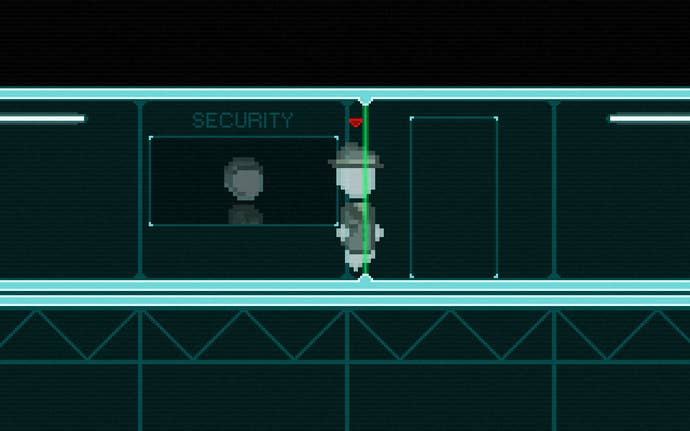
"I don't think we designed the game with a specific type of player in mind exactly," Carroll continues, "although I think the genre kind of lends itself to that in the design process by default. The player's almost certainly going to be a fan of narrative-heavy games with a relatively slow pace, for example."
Raze adds an interesting point.
"I'm not normally a huge fan of adventure games that don't take place in a real-world setting," he says, "because then you end up with weird, made-up puzzle game logic. I particularly don't often play futuristic sci-fi games; if I do go for sci-fi it'd be something like [Wadjet Eye Games'] Resonance. Writing Location Services presented a fun challenge in that I wanted to write something I would be into, but also appeal to genre fans. Hopefully I've managed that!"
One of the most striking things about Location Services is its deliberately abstract aesthetic; while Raze admits that the art in Richard & Alice was the way it was more out of necessity than anything else, it's immediately obvious that Location Services has been designed from the ground up with its "'80s green-screen monitor" look in mind. I asked Carroll where this distinctive appearance came from.
"Fun fact: there isn't a single gun in the game."
"When Lewis pitched the idea for Location Services to us, he'd made sort of a proof of concept that made use of really simple pixel art with the same sort of very simple blue-green palette you see now," she explains. "I wasn't going to do the character art at first, but then decided to do a mock-up and we ended up using it! We just wanted the game to look pretty overtly like it was set in a digitized world; some weird mixture of '30s noir and '80s sci-fi movies."
'30s noir and '80s sci-fi, eh? Did any specific works of art influence the new game, or is it a more "evoking the era" sort of thing?
"Haha, I never know how to answer this," laughs Raze. "Loads of things inspire me, but not necessarily in ways that are tangible or that I could explain. For Location Services, there was actually a fair bit of music that inspired me in particular, although I think if I talk about that too much, it'll ruin a bit of a cool moment halfway through the game. There's a section that revolves around the music I was listening to while writing it a bit, which was fun to do."
"I was reading Raze's script for Location Services as he wrote it," adds Carroll, "so that's inspired a lot of the work I've done as far as the level design and characters. In general, a lot of my contributions are probably subconsciously inspired by David Lynch and Kurt Vonnegut."
Carroll's comment highlights a particularly interesting aspect of Location Services' development, and one which is a particular luxury afforded to small-scale independent developers that often isn't possible or practical in larger outfits: the ability to work with a writer from a game's inception, allowing for a much more coherent expression of the writer's intentions supported by the work of the artists and programmers. Location Services, as with Richard & Alice before it, is a game designed around the story it wants to tell rather than, as sadly more frequently occurs with more large-scale studios, a game where the story was crammed in more as an afterthought than anything else.
Finally, I decide it would be remiss of me not to ask the question that all game journalists have asked at one point or another in their career, usually when they can't think of anything else to say: how many guns are in your game?
"Fun fact: there isn't a single gun in the game," replies Raze immediately, taking my question a lot more seriously than I had intended or expected. "There is something that shoots lasers in one scene, if that counts, but story-wise the concept of guns doesn't actually make sense in The Server. However, there is a pretty lethal basketball at one point."
You heard it here first, folks.
Location Services is in active development right now, and will be released "at some point in the future" for Windows PC. In the meantime, you can follow what Owl Cave is up to via its official site, check out Richard & Alice here, and watch this space for a preview of Location Services itself very soon.
Thanks to the fine people of Owl Cave for their time.
